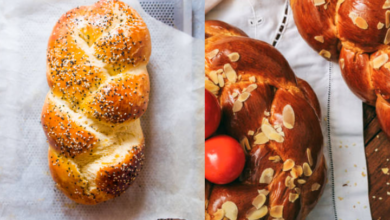Is Challah Bread Dairy Free? The Surprising Truth Revealed!
What To Know
- Whether you enjoy it for religious occasions, special gatherings, or simply as a delightful treat, challah bread is a versatile and delicious bread that can be enjoyed by all.
- Dairy-free challah bread is suitable for people with dairy allergies or sensitivities, it is vegan-friendly, and it is often lower in saturated fat and cholesterol compared to traditional challah bread.
- Yes, you can substitute dairy-free milk and butter for traditional milk and butter in a challah recipe to make it dairy-free.
Challah bread, a traditional Jewish bread, has been enjoyed for centuries for its soft, fluffy texture and distinctive braided appearance. But for those with dairy allergies or sensitivities, the question arises: is challah bread dairy free?
The answer is yes, most traditional challah bread recipes do not contain any dairy ingredients. The primary components of challah dough are flour, water, yeast, sugar, salt, and oil. However, some variations of challah bread may include dairy products such as milk, butter, or eggs.
Ingredients Commonly Used in Challah Bread
Flour: Typically, all-purpose flour is used, which is naturally dairy-free.
Water: Water provides moisture and helps activate the yeast.
Yeast: Yeast is a fungus that ferments the dough, creating air bubbles and causing the bread to rise.
Sugar: Sugar feeds the yeast and adds sweetness to the bread.
Salt: Salt balances the sweetness and enhances the flavor.
Oil: Oil adds moisture and richness to the dough. Traditional challah recipes use vegetable oil, which is dairy-free.
Variations That May Contain Dairy
While traditional challah bread is dairy-free, some variations may incorporate dairy ingredients. These include:
Milk: Milk can be added to the dough for a richer flavor and softer texture.
Butter: Butter can be used to brush the top of the bread before baking, giving it a golden-brown crust.
Eggs: Eggs can be added to the dough to enhance its richness and binding properties.
Finding Dairy-Free Challah Bread
If you are looking for dairy-free challah bread, here are some tips:
- Check the ingredient list carefully: Look for challah bread that does not list any dairy ingredients, such as milk, butter, or eggs.
- Ask at your local bakery: Many bakeries offer dairy-free challah bread options.
- Make your own: You can easily make your own dairy-free challah bread using a traditional recipe and substituting vegetable oil for butter and water for milk.
Benefits of Dairy-Free Challah Bread
Dairy-free challah bread offers several benefits, including:
- Suitable for people with dairy allergies or sensitivities: It provides a safe and delicious bread option for those who cannot tolerate dairy.
- Vegan-friendly: Challah bread made without eggs or dairy is suitable for vegans.
- Healthier option: Dairy-free challah bread is often lower in saturated fat and cholesterol compared to traditional challah bread.
Enjoying Challah Bread with Confidence
Whether you have dairy allergies or simply prefer a dairy-free diet, you can enjoy the deliciousness of challah bread without worry. By checking the ingredients, asking at bakeries, or making your own, you can find dairy-free challah bread that meets your dietary needs.
A Culinary Delicacy for All
Challah bread has long been a culinary staple, and its dairy-free variations make it accessible to everyone. Whether you enjoy it for religious occasions, special gatherings, or simply as a delightful treat, challah bread is a versatile and delicious bread that can be enjoyed by all.
Frequently Asked Questions
Q: Is all challah bread dairy-free?
A: No, some variations of challah bread may include dairy ingredients such as milk, butter, or eggs.
Q: How can I make sure my challah bread is dairy-free?
A: Check the ingredient list carefully or ask at your local bakery if they offer dairy-free challah bread options. You can also make your own using a traditional recipe and substituting plant-based ingredients.
Q: What are the benefits of eating dairy-free challah bread?
A: Dairy-free challah bread is suitable for people with dairy allergies or sensitivities, it is vegan-friendly, and it is often lower in saturated fat and cholesterol compared to traditional challah bread.
Q: Can I use dairy-free milk and butter in a traditional challah recipe?
A: Yes, you can substitute dairy-free milk and butter for traditional milk and butter in a challah recipe to make it dairy-free.
Q: Is challah bread considered a kosher food?
A: Yes, traditional challah bread is considered a kosher food when made with kosher ingredients and prepared according to Jewish dietary laws.
